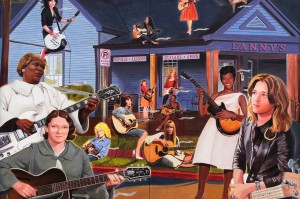Here is a true story. When I was 22, car-less, broke, and brand-new to Nashville, I stepped out of my Cleveland Park home, into the thick August heat, determined to find community. I had been living here about two weeks, and without a car (or even a drivers’ license!), I was geographically isolated, and hungry for connection (and, just hungry.)
That day, I headed south by foot, crossed main street, and wandered into the 5 Points district and saw, from a distance, the bright blue exterior of Fanny’s.
The Manifestation of a Dream
It sounds like an exaggeration, but when I stepped in the door, my world changed. I met the owners, P and Leigh and was in awe of the first woman-owned instrument shop I’d ever seen. Tragedy of that statement aside, this was an empowering experience. To stand in Fanny’s is to stand in the manifestation of a dream — the dream of two women who busted out of the claustrophobic limits of a patriarchy and chose the path of love and power in the name of future generations, the dream of a community longing for a place where we can lay down our shields and be ourselves, and my own dream: a place for a wandering girl to belong.
P and Leigh are all smiles and kindness and open arms. But do not let their southern and midwestern hospitality fool you. Like all quiet revolutionaries, they are here to change the world.
The Heart of the Scene
I believe firmly that Fanny’s is the nucleus for today’s modern Nashville music scene, where blue-and-purple-haired children of all skin-tones and pronouns can gather with safe adults and learn to fearlessly express themselves, starting punk bands (like Queens of Noise) and rock out on the Fanny’s porch for a crowd of cheering teens. Local musician authors, like Ryan Madora can sell their self-published books. Projects like She’s A Rebel, an annual tribute to the girl group sounds of the 50s & 60s, entirely performed and produced by women in Nashville, TN gather here to make this important concert a reality. Local arts non-profits like Girls Write Nashville, Jessi Zazu Inc, and YEAH springboard with Fanny’s support through show sponsorships, instrument donations, and more. I will say it again: Fanny’s is the nucleus of the modern Nashville music scene.
The first of its kind
In music history, every scene revolves around spaces, but traditionally they have been designed by cis-men for cis-men. When I think of the Greenwich Village folk scene, I think of Gerde’s Folk City. When I think of the 1960’s Hippie revolution, I think of Haight Street in San Francisco. When I think of early Jazz, I think of New Orleans’ Storyville district in the early 20th Century. Spaces are cultures’ version of generational wealth — we pass them on through centuries, entrusting them in the hands of the next generation to keep the legacy alive. The community voice outlives every individual member of the scene and informs how we express ourselves, what our values are, and most importantly, who gets to hold the microphone.
How many of these historical arts-based spaces, though, are built by women and serve a scene that truly represents the city they live in, generationally, culturally, and socially? I am by no means a music historian, but I would say very few, if any at all. The fact that Fanny’s is a space the next generation will inherit, continue to feed, and pass on and on through history, means that more women, people of color, queer folks, will be the spacerholders.
As a community music teacher, I know that when I send a 6 year old girl to Fanny’s to buy her first ukulele, she is immediately welcomed into the Nashville music scene. I know she is just as important as the many high-visibility customers who also regular come though those doors.
The ones who will carry the torch
I was recently chatting with a young woman, Charissa Hoffman, who had learned to play ukulele at Fanny’s as a young kid, and has just graduated Berklee College of Music as their first female ukulele major in school history. In reflecting on the role of Fanny’s in her life, Hoffman (21) said:
“As a musician I often find myself in settings, both professional and informal, where I’m the only woman in the room. Often I find myself pushing back against preconceptions or biases against my gender or instrument. When I was an anxious, desperate-for-validation teenager the (people at) Fannys treated me as an equal; because this attitude was modeled for me I can walk into difficult settings with confidence and compassion, knowing I deserve a seat at the table. They are an indispensable bright light in our community!”
Hoffman is one of many local Gen-Zers, raised by the space that Fanny’s creates, stepping into adulthood ready to re-define normal. Those of us fed by the Fanny’s dream reject the tired old notion that artistic spaces are passed down only by older men to younger men. Fanny’s is more than a music store — it is a family heirloom the next generation will inherit, it is a quiet, open-armed revolution.
To learn more about how you can support Fanny’s in fostering a safe, multi-generational arts space, visit https://www.fannysschoolofmusic.org
Blog by Georgia English / a Nashville-based musician, writer, illustrator, and educator.

